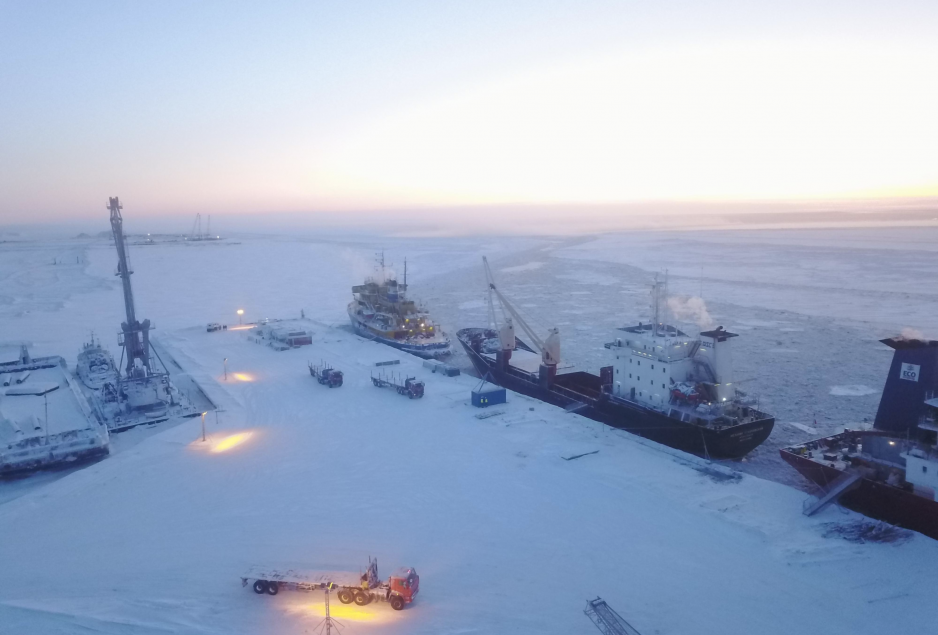Despite COVID-19, Novatek’s Arctic LNG 2 project remains on schedule
A coronavirus outbreak at a key construction site won't keep the project from hitting its 2022 production start date, the company told investors.

Russian natural gas giant Novatek remains optimistic that its largest and newest liquefied natural gas project, Arctic LNG 2, is on track to begin production by the end of 2022. With a capacity of 20 million tons of LNG per year, this new project will supplant the company’s existing Yamal LNG plant.
According to an update to investors earlier this month, about 20 percent of construction has been completed so far. Unlike Yamal LNG which was constructed on land, Arctic LNG 2 project will utilize a number of gravity based structures — a support structure purposely sunk in shallow waters and held in place by gravity commonly used by offshore oil platforms — upon which the liquefaction plant will be constructed.
About 37 percent of the first GBS platform has been completed and construction continues at full capacity at the Belokamenka construction site near Murmansk. The natural gas for Arctic LNG 2 will come from the Utrenneye gas field where nine production wells have already been drilled with three drilling rigs in operation, Novatek confirmed.
In April and May there were concerns that a Covid-19 outbreak at Novatek’s construction site for the GBS platforms in Belokamenka near Murmansk could have an impact on the timeline of the project. The construction site is home to about 11,000 workers and authorities registered more than 2,200 cases of COVID-19 at Belokamenka.
The outbreak, however, was brought under control and by the middle of June only a few new cases were registered. Novatek’s industrial port city of Sabetta, from where gas from Yamal LNG is exported, has thus far only seen a small number of cases.
On track for 2022 with help from Western partners
Novatek also disclosed that it has made progress securing contracts for LNG volumes. As with Yamal LNG, the majority of LNG will be sold under long-term contracts to the company’s partners and investors in Asia, especially China.
While Russian officials frequently highlight the extent to which Arctic LNG 2 relies on Russian companies and resources, the project has nonetheless attracted a wide range of international partners — despite the continuation of Western sanctions broadly targeting Russia’s oil and gas industry.
French energy major Total acquired a 10 percent stake in the project in May 2018. Companies such as Germany’s Siemens and Italy’s Saipen were awarded multi-billion contracts to help engineer and construct Arctic LNG 2. Norway’s Olav Olsen, an independent structural and marine consulting company, was also contracted to provide front-end engineering and design for the GBS.
More gas requires more nuclear icebreakers
An important part of Novatek’s Arctic gas “puzzle” is the next generation of Rosatom’s nuclear icebreakers. As Russia’s existing nuclear icebreakers will be reaching the end of their useful lifespan in the coming years, the country embarked on constructing five new nuclear icebreakers, named the Arktika class.
The first vessel of this class, also named Arktika, was launched in 2016 and after ongoing delays with its steam turbine began sea trials this past week.
It will enter into trial service this fall and will be deployed for the winter navigation season of 2020-2021, but will have to return to dry dock in Kronstadt to replace a faulty propulsion motor in August 2021.
Until then the new icebreaker’s power output will be reduced by around 15 percent from 60MW to 50MW slightly reducing its icebreaking capability from 2.9 meters to 2.7 meters ice-thickness and reducing maximum speed by 0.6 knots to 21.4 knots.
The goal of year-round Arctic shipping
Novatek’s and Russia’s efforts to export natural gas year-round to Asia via the Northern Sea Route took an important step last month when several of the company’s specialized Arc7 ice-breaking LNG carriers embarked on a record-early trip to China. During the past several years, the first eastbound voyages from Yamal LNG didn’t occurred before July. As Arctic sea ice continues to melt, Novatek’s goal is for the highly capable Arc7 vessels to travel to Asia even when ice is still thick during late spring and early winter.
Earlier this month, Russian Prime Minister Mikhail Mishustin highlighted the importance of icebreakers for the oil and gas industry in the Arctic stating that icebreakers will be key to unlocking the full transport potential of the NSR. “It is necessary to continue developing the fleet of powerful modern icebreakers. This is an important and necessary work for the country,” explained Mishustin.
Construction on the fourth Arktika-class icebreaker, Yakutia, began last month, with the fifth to follow next year. An even larger nuclear-powered icebreaker, the Lider-class, was recently approved and three vessels of this type are scheduled to follow by 2033 allowing for year-round escorts of oil and gas carriers along the NSR.